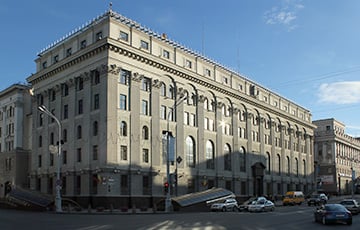National Bank Of Belarus Assessed Consequences Of Sanctions For Human Rights Violations
3- 5.07.2021, 15:15
- 12,640

Lukashenka's financial system is crumbling away.
The rating agency Standard & Poor's previously published a release in which it noted the growing degree of uncertainty and increased risks to the financial stability of Belarus.
The National Bank of Belarus adjusted the forecasts, and analyzed the possible consequences of external threats for the Belarusian economy.
"The challenges in which the financial sector functions are significant and have grown significantly," Deputy Chairman of the National Bank Dzmitry Kalechyts admitted in an interview with BelTA.
He attributed the risks to:
The main ones are related to credit risk and liquidity risk.
The shocks had a negative impact on the state of enterprises in the real sector and limited their ability to service their obligations.
The high level of currencyization of the banking sector's assets and liabilities is also a significant risk to the country's financial stability.
The level of external debt has grown.
A significant challenge was the disruption of the savings process, accompanied by an increased demand for foreign currency and resulting in pressure on banks' ruble liquidity.
The banker acknowledged that the sanctions will affect the state of the financial sector: "indeed, these measures will have a certain impact on the financial sector."
Among the possible consequences, he named:
These measures will have some impact on the financial sector. It can be expected that in the future the volume of Belarusian exports and, accordingly, the volume of foreign exchange earnings will slightly decrease.
Considering the high import intensity of the Belarusian economy, imports will also decrease.
Taken together, the impact of this shock on the balance of foreign trade will be moderate and protracted over time.
To a certain extent, the possibilities for attracting foreign financing will decrease.
This may most strongly affect the sphere of external public debt, where there is still a need to refinance rather large amounts of debt.
Dzmitry Kalechyts believes that pressure on the foreign exchange market can be expected to increase. However, given the inertia of economic processes, this will not happen all at once, the effects of external shocks will manifest themselves gradually. At the same time, in addition to the direct impact through the channels of foreign trade and the balance of payments as a whole, the consequences of restrictive measures may increase due to the fact that internal factors are added to the external ones.
As negative expectations remain elevated, the outflow of funds of individuals from the banking system continues, as well as the demand for foreign currency in the domestic market. This does not have the best effect on the resources of financial institutions and their possibilities for lending to the economy. As a result of additional shocks, such expectations may increase even more.









